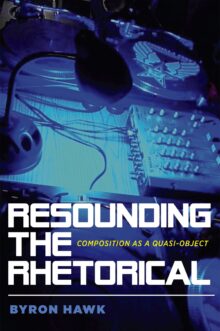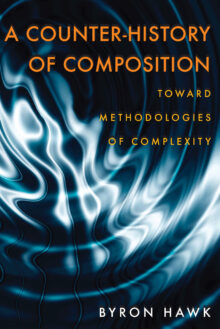
Byron Hawk
Byron Hawk is associate professor of English at the University of South Carolina. He is the author of A Counter-History of Composition: Toward Methodologies of Complexity, winner of the W. Ross Winterowd Award, and coeditor of Small Tech: The Culture of Digital Tools.
Resounding the Rhetorical
Composition as a Quasi-Object
Resounding the Rhetorical offers an original critical and theoretical examination of composition as a quasi-object. As composition flourishes in multiple media (digital, sonic, visual, etc.), Byron Hawk seeks to connect new materialism with current composition scholarship and critical theory. Using sound and music as his examples, he demonstrates how a quasi-object can and does materialize for communicative and affective expression, and becomes a useful mechanism for the study and execution of composition as a discipline. Through careful readings of Serres, Latour, Deleuze, Heidegger, and others, Hawk reconstructs key concepts in the field including composition, process, research, collaboration, publics, and rhetoric. His work delivers a cutting-edge response to the state of the field, where it is headed, and the possibilities for postprocess and postwriting composition and rhetoric.
A Counter-History of Composition
Toward Methodologies of Complexity
A Counter-History of Composition contests the foundational disciplinary assumption that vitalism and contemporary rhetoric represent opposing, disconnected poles in the writing tradition. Vitalism has been historically linked to expressivism and concurrently dismissed as innate, intuitive, and unteachable, whereas rhetoric is seen as a rational, teachable method for producing argumentative texts. Counter to this, Byron Hawk identifies vitalism as the ground for producing rhetorical texts-the product of complex material relations rather than the product of chance. Through insightful historical analysis ranging from classical Greek rhetoric to contemporary complexity theory, Hawk defines three forms of vitalism (oppositional, investigative, and complex) and argues for their application in the environments where students write and think today.
Hawk proposes that complex vitalism will prove a useful tool in formulating post-dialectical pedagogies, most notably in the context of emerging digital media. He relates two specific examples of applying complex vitalism in the classroom and calls for the reexamination and reinvention of current self-limiting pedagogies to incorporate vitalism and complexity theory.


